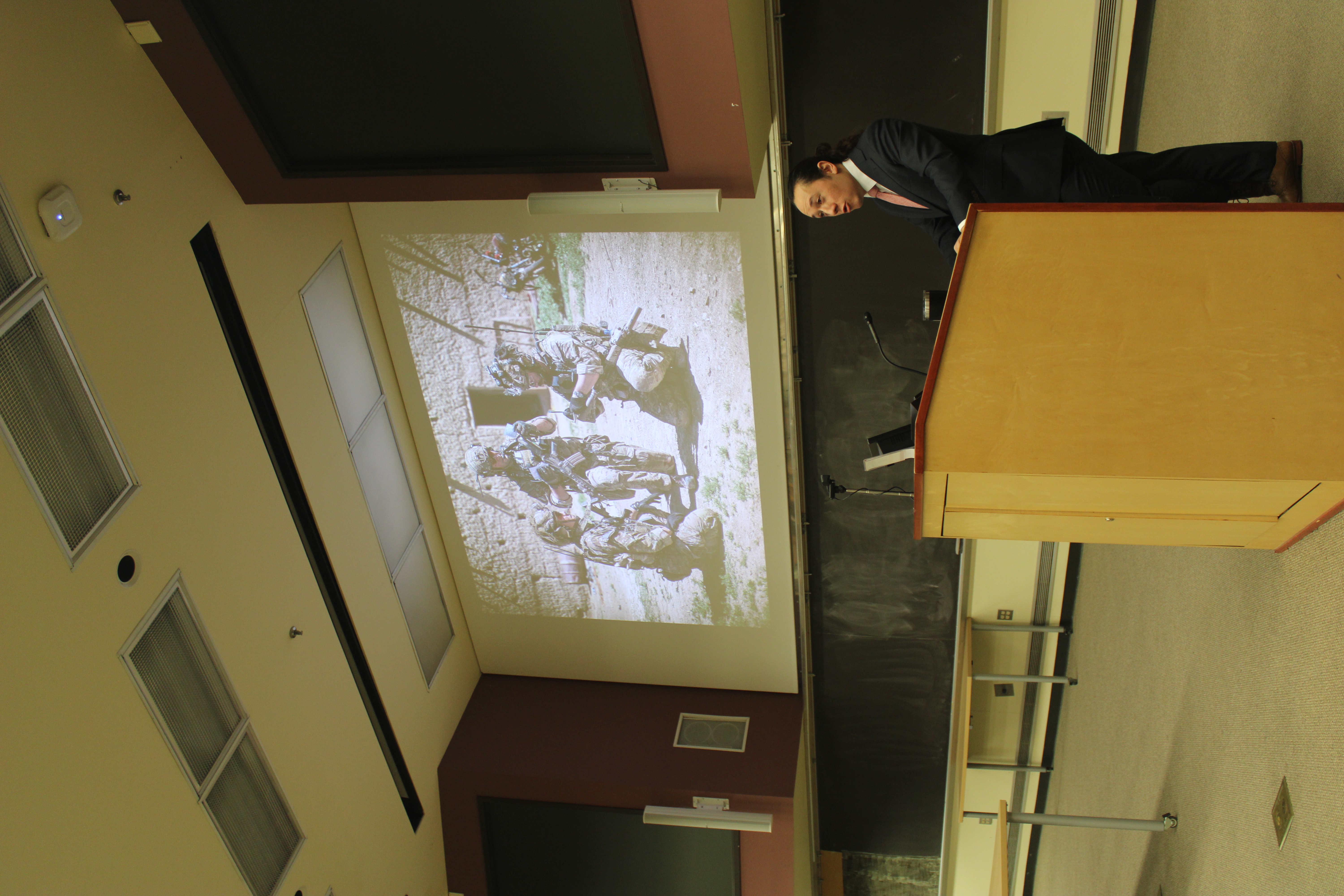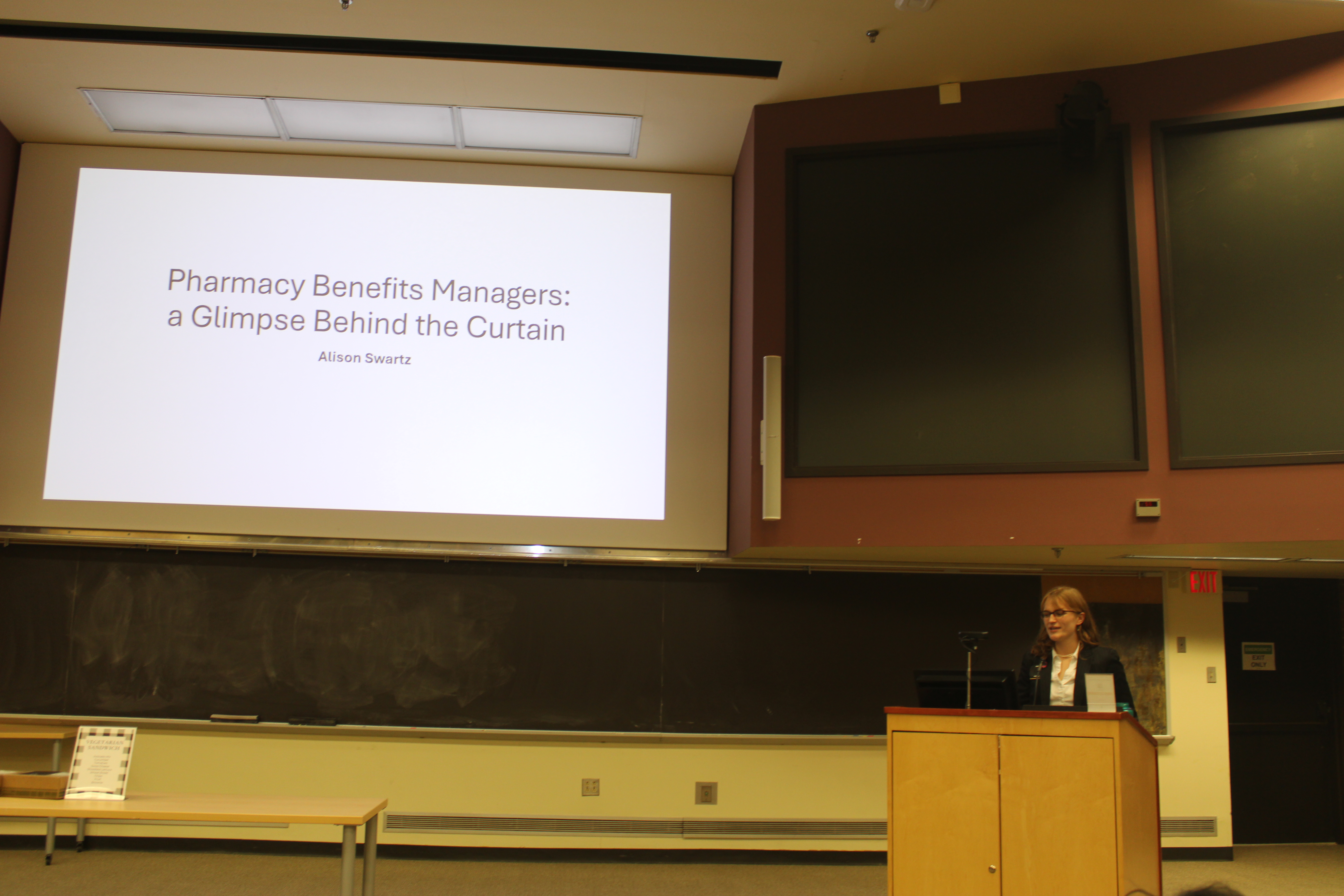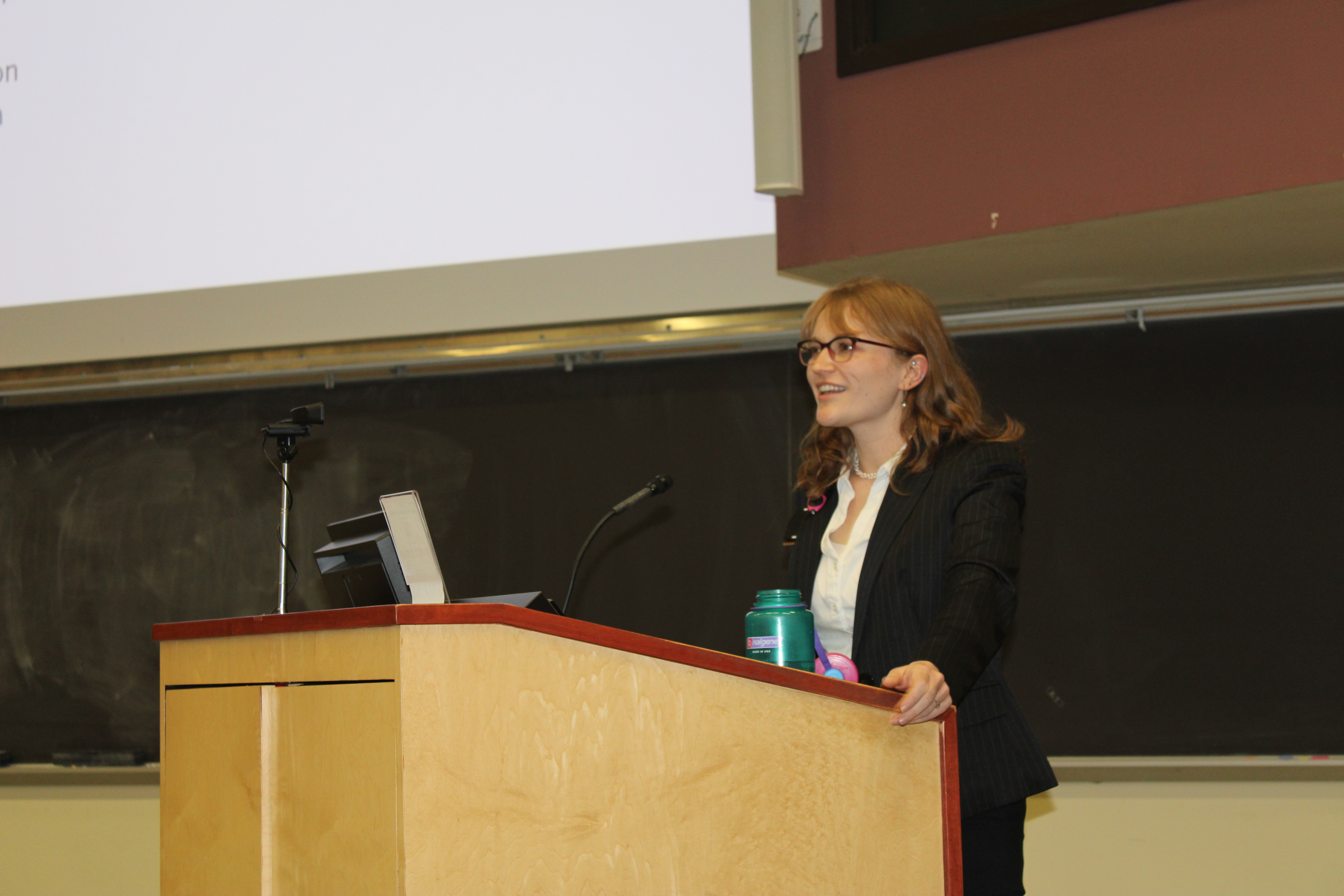2024 Student Flexner Lectures Examine Values of Service, Navigating the Insurance Industry
M3 Gunther Wong and M4 Alison Swartz offer their peers valuable insights from their past career experiences
By Kyra Letsinger
In the early 2000s, former Associate Dean for Medical Student Affairs Bonnie Miller, MD, organized an unscheduled Deans’ Hour, a space in the curriculum created to provide a formal lecture opportunity for students and faculty to attend. Today, this opportunity has turned into a tradition known as the Flexner Deans’ Lecture series, a set of student-organized presentations given by invited field professionals from across the country centered around speakers’ greatest passions.

While presentations like NASA astronaut Dr. Drew Gaffney’s on medical research in space and major television personality Jon Stewart’s on healthcare advocacy work offer an incredible opportunity to hear a unique perspective, some of the year’s most poignant lectures do not come from big-name guests at all; rather, they come from the heart of VUSM: our students. Each year, two M3 or M4 students are chosen to give the Student Flexner Lectures, a chance to share the life experiences that impact them most as aspiring physicians. More than just sharing their stories, though, student lecturers have the opportunity to provide insights that help their peers see both industry and personal topics in a new light.
This year’s lecturers are both uniquely qualified to give an outsider’s perspective as neither began their career journeys with the intention of becoming doctors. Prior to med school, M3 Gunther Wong spent seven years in the military, while M4 Alison Swartz spent two and a half years in insurance and pharmacy. Eventually, both found themselves at the same crossroads, feeling called towards a new path that would ultimately lead them to VUSM. It’s these past experiences that now inspire the two student lecturers to share with their peers, a unique opportunity to educate by allowing paths old and new to overlap.
Reflecting on Service and its Moral Value
When Gunther Wong was preparing to graduate high school, he was unsure of his next steps. He knew he wanted a career with a sense of purpose but was unsure of what that looked like, so he dove headfirst into research, a frequent practice for the practical M3. Thankfully, it wasn’t long before he found his answer, a role that would provide him with everything he was searching for: structure, motivation, and a strong sense of belonging. Gunther Wong was going to join the military.
“I think everyone when they’re 18 are trying to find a trying to find a way to transition and mature,” said Wong, “The military has many aspects that satisfy that kind of existential yearning to come of age.”

Over seven years, three deployments to Afghanistan, and rising to the rank of 1st lieutenant, what Wong found was far more than just a way to grow into adulthood, though: He ultimately discovered who he is as a leader, what it means to be a part of a team, and perhaps most impactfully, what his personal and professional values are.
Determining some of these values came naturally, but others pushed Wong to dig deeper and examine the residual impact of war. One of the questions he posed to himself would actually go on to become the inspiration for his lecture topic, “Duty, Honor, and the complexity of Wartime Service.”
“Is there still moral value in duty, honor, and faithful service when the outcome is morally injurious?” posed Wong. “Or stated more bluntly, does the end justify the means?”
Wong’s talk examines the motivations to serve, the morally ambiguous actions taken by the U.S. military in Afghanistan during his time deployed. Wong says the goal in discussing these complex ideas is ultimately to exemplify that despite the debated ethics of military measures, there is inherent value in his service.
“Duty and faithful service are cornerstones to strong institutions and societies,” said Wong. “They contain inherent value beyond the short-term outcomes of those institutions and societies.”
This mindset is one Wong says is important for his peers to implement when working in a hospital setting, especially post-grad in their residency programs. Oftentimes, medical institutions can be heavily criticized for the debated ways in which they function, much like the actions of the military. But Wong says thinking like this prevents physicians from realizing the good they are doing each day, and highlights the need for trust and loyalty.
“The choice to be a part of that institution and being part of its work every day is valuable,” said Wong, “People can be a little bit like negative about the organizations they work for because of bigger picture outcomes, but at its core, it’s truly rewarding to be a part of these medical institutions. It’s important to have faith in these organizations, to work hard to make them better, and really be a part of the team.”
Navigating a Different Kind of Battle

Alison Swartz found inspiration for her Student Flexner Lecture after being in the middle of a different fight for life and death, in the field of medical insurance.
Immediately out of high school, Swartz took the pharmacy technician certification exam. She took a gap year before college, and both for career exploration and to support herself, took a job with a national pharmacy benefits manager (PBM). But rather than an exciting learning opportunity about the intricacies of the other side of the pharmaceutical industry, Swartz said her time working in prior authorizations was instead a disheartening wake up call.
“Once a nurse called me to try and get approval for an inhaler for a child–a child who obviously needed it,” said Swartz, “I didn’t actually deny any cases at my level; I was only able to approve them or pass them on for a pharmacist’s review. I didn’t have what I needed to approve it immediately, so I passed the inhaler case on, and I was sure it was going to be approved. They told us it was a HIPPA violation to write case numbers down and check on them, but I was emotionally invested, so I did, and a couple of days later I realized it was denied.”
Swartz proceeded to dig deeper, looking into her past cases, to see just how many others with clear cut cases had experienced a similar fate. Unfortunately, what she uncovered was a gut-wrenching reality: Any case she had passed on had been denied, even with requests for life-saving medications like insulin.
“And that’s when I realized, ‘I’m in the Death Star. This is bad,’” said Swartz. “So, I got out of there and moved to CVS, literally the first job I could get.”

Despite the frustration Swartz felt during the experience, she says it is not one she would change for anything. Rather, she keeps the lessons learned working for a PBM top of mind in her patient interactions today.
“Over time, I thought about how much I benefit from having that prior knowledge,” said Swartz. “Even just a slight amount of extra information can really change how people approach prior authorizations and the pharmacy benefits management system.”
With such unique and beneficial background knowledge, Swartz jumped at the opportunity to share insights with her peers through the Flexner Student Lecture. Her talk, entitled, “Pharmacy Benefits Managers: A Glimpse Behind the Curtain,” intends to inform current and future physicians about how to approach prior authorizations, increase the chances of securing an approval, and in turn improve the care patients receive. She hopes that through her teachings, those in attendance feel more comfortable in taking on PBMs, a sometimes-overlooked aspect of a physician’s role.
“I think we all know that we have a broken healthcare system that neither serves our patients nor us as clinicians,” said Swartz. “Every time that we go to a lecture about a way in which this system is broken, we all feel really frustrated because we know we can’t do anything about it. I want to present what one of the problems is just so people are aware and then give them a framework that they can use to navigate within the system we have now.”
Where to View the 2024 Student Flexner Lecture
Both Wong and Swartz hope to make an impact not only on their peers, but on all members of the Vanderbilt community, whether those they speak to directly or those who experience the lessons attendees hopefully implement. To view the Student Flexner Lectures after the fact, the recorded talks can be viewed via the link on the Vanderbilt University Medical Center website.